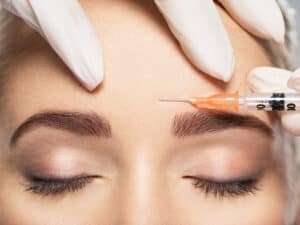
Neuromodulators is a popular cosmetic injectable known for its anti-wrinkle properties. Our certified plastic surgeon has offered neuromodulators for decades and knows how to expertly inject the neuromodulator to reach your desired results. Dr. Arie Benchetrit has helped many patients reduce lines and wrinkles with neuromodulators and often hears the same questions during consultations.
1. Are neuromodulators Injections Safe?
Neuromodulators has been used since the late 1980s for cosmetic and medical purposes. Made with botulinum toxin type A, Neuromodulators is considered safe and effective, even with repeated use. Most patients enjoy smoother skin with fewer lines and wrinkles with little to no side effects. A 2020 review of neuromodulators treatment published in Advances in Dermatology and Allergology found that most adverse events were benign. Patients who experienced these side effects reported they appeared a few days after neuromodulators treatment, were limited to the treated area and typically disappeared without further treatment.
Adverse reactions that were cosmetic or functional in nature involved responses from different muscles than the treated area or misplacement of botulinum toxin. However, these complications are mitigated by choosing a certified plastic surgeon or medical professional trained to provide neuromodulators treatments. Never get neuromodulators at a hotel or party to save on costs, as this can increase the risk of poor results and side effects.
2. How Does neuromodulators Work for Wrinkles?
neuromodulators is made with a purified neurotoxin called clostridium botulinum bacteria. The gel is injected into the forehead, between the brows or other areas of the face and neck to smooth dynamic wrinkles that form after years of repeated facial expressions. Neuromodulators targets these muscles and temporarily immobilizes them to smooth the overlying skin. Neuromodulators works best on wrinkles that form due to frowning, squinting, smiling and other muscle movements.
3. What Can Neuromodulators Do?
Neuromodulators can smooth lines and wrinkles and improve various health concerns, such as chronic migraine, hyperhidrosis (excessive sweating), cervical dystonia, bladder dysfunction, lazy eye and eye twitching (blepharospasm). The injectable is most often used for forehead lines, vertical lines between the brows and crow’s feet on the outer corners of the eyes. Dr. Benchetrit also uses neuromodulators for smile lines around the nose and mouth, lip augmentation (called the neuromodulators lip flip), neck bands and the “neuromodulators Browlift” to elevate sagging eyebrows.
4. When Does Neuromodulators Wear Off?
Visible results typically take three to five days to appear as the creases and folds on top of the treated muscle smooth over. Full results settle in around seven to 10 days after neuromodulators treatment and often last three to four months. However, each patient is unique and may respond differently to neuromodulators. Some patients may enjoy their results for less than three months before additional treatment is necessary, while others may have effects that last closer to six months.
5. Where Can Neuromodulators Be Injected?
Only a qualified healthcare provider should inject neuromodulators to ensure patient safety and effective results. Neuromodulators can be injected into the forehead, around the eyes, eyebrows, sides of the nose, lips, mouth, neck and other areas.
Dr. Benchetrit understands many patients have questions and concerns about neuromodulators before their treatment and uses the Vectra 3D photography system to simulate results. The Vectra system uses 3D images of the patient to preview their potential results with injectables and other cosmetic treatments and procedures.
If you’re interested in neuromodulators, contact Dr. Benchetrit in Montreal and Pointe Claire, Quebec, at (514) 700-5233.
















